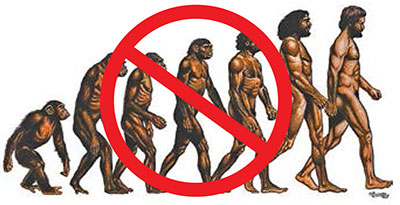Textbooks around the world contain the well-known illustration of walking apes transitioning into a modern human. I recently heard a college student, raised in a Christian home, say these pictures convinced her of evolution. She probably represents countless others swayed by this simplistic icon. But those willing to question the concept that man descended from apes can welcome the recent study of a discovery from China. It adds to the list of important finds that refute human evolution and its illustrations.
Researchers from Australia and China analyzed a portion of a human femur (thigh bone) found in Red Deer Cave in Yunnan Province, China, during a 1989 excavation.1 The researchers noted the bone looks like Homo habilis and Homo erectus femurs found in Africa.2 Those presumed early versions of an evolving mankind supposedly went extinct over 1.5 million years ago, but evolutionary methods dated the Chinese cave finds to only about 14,000 years ago!
What does this mean?
 In terms of the ape-to-man icon that creation researcher Marvin Lubenow called “the fake parade,”3 it means that drawings of the club-wielding “early” men should be redrawn to show them walking beside modern-looking men, not behind them. In terms of biblical history, this find supports what creation-based scientists have been saying for many years about fossils of extinct human varieties: They, along with all modern humans, descended from Noah’s sons.4
In terms of the ape-to-man icon that creation researcher Marvin Lubenow called “the fake parade,”3 it means that drawings of the club-wielding “early” men should be redrawn to show them walking beside modern-looking men, not behind them. In terms of biblical history, this find supports what creation-based scientists have been saying for many years about fossils of extinct human varieties: They, along with all modern humans, descended from Noah’s sons.4
Other amazing discoveries confirm this conclusion. For example, a cache of wildly different-looking human fossils pulled from a Georgian cave and reported in 2013 also had human varieties designated H. erectus and H. habilis deposited during the same timeframe.5
And consider what Lubenow said about human fossils from a famous cave in Spain.
Further, thanks to the extreme variation seen in the Sima de los Huesos [cave] fossil collection, the distinctions made by evolutionists between Homo erectus, early Homo sapiens, Neandertal, and anatomically modern Homo sapiens now fade into insignificance. It is a remarkable affirmation of…Acts 17:26, “From one man he made every nation of men, that they should inhabit the whole earth.”6
The fake parade shows early apes becoming stooped caveman creatures, and finally modern man. Any of these three cave finds dismantles at least part of the fake parade by jumbling its “early man” time sequence. Other fossil sites show a time overlap between modern looking humans and extinct apes.3 If one believed apes evolved from ancient man, one could just as easily draw another fake parade of humans on the left stepping down to apes on the right without violating the fossil record.
The supposedly archaic human femur found in the cave deposit from China and finds from other caves around the world all clash with the story of human evolution and confirm that humans have always been humans.
References
- Smith, D. ‘Red Deer Cave’ bone points to mysterious species of pre-modern human. University of New South Wales news release. Posted on newsroom.unsw.edu.au December 18, 2015, accessed January 5, 2016.
- Curnoe, D. et al. 2015. A Hominin Femur with Archaic Affinities from the Late Pleistocene of Southwest China. PLoS ONE. 10 (12): e0143332.
- Lubenow, M. 2004. Bones of Contention. Grand Rapids, MI: Baker Books, 167.
- For example, see Thomas, B. Human Remains in Spain: Neandertal or Not? Creation Science Update. Posted on icr.org July 2, 2014, accessed December 29, 2015.
- Thomas, B. and F. Sherwin. Human-like Fossil Menagerie Stuns Scientists. Creation Science Update. Posted on icr.org November 8, 2013, accessed December 29, 2015.
- Lubenow, Bones of Contention, 201.
Image Credit: Copyright © 2016 D. Curnoe, J. Xueping and P. Schouten. Adapted for use in accordance with federal copyright (fair use doctrine) law. Usage by ICR does not imply endorsement of copyright holder.
* Mr. Thomas is Science Writer at the Institute for Creation Research.













